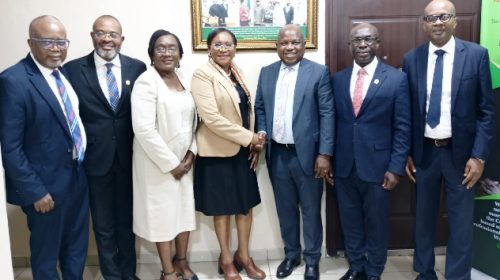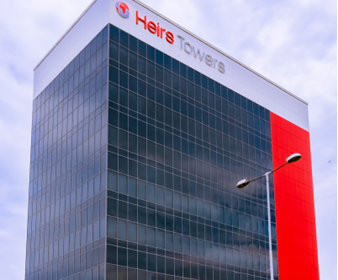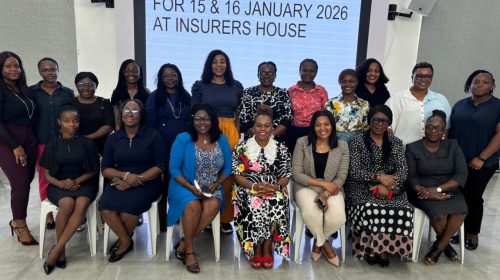Elumelu tasks FG on $14 bn annual infrastructure deficit

The Chairman, Heirs Holdings Limited, Mr. Tony Elumelu at 2017 National Insurance Conference of the Insurance Industry Consultative Council (IICC) tasked the Federal Government on the need to speedily address the issue of $14bn annual infrastructure deficit in the country.
Here, is his full business paper presented at the event,
NIGERIA OPEN FOR BUSINESS Paper Delivered ByTony O. Elumelu, CON Chairman, Heirs Holdings Limited &Founder, The Tony Elumelu Foundation At The 2017 NATIONAL INSURANCE CONFERENCE Monday, July 10, 2017 Abuja – FCT
Introduction
Your Excellency, Acting President Yemi Osinbajo;
The Honourable Minister of Finance, Mrs. Kemi Adeosun;
Distinguished ladies and gentlemen;
Let me start by recognizing the presences of EVC of the NAICOM.
My name is Mr. Tony O. Elumelu (CON) and I am the Chairman of Heirs Holdings Limited, an African proprietary investment company, with interests in power, oil and gas, financial services, hospitality, real estate and healthcare, present in twenty African countries. I am also the Founder of the Tony Elumelu Foundation.
I thank the Chairman, Lady Isioma Chukwuma, and members of the Insurance Industry Consultative Council (IICC) for this invitation to discuss the very interesting topic of “Nigeria open for business”.
This topic is especially timely as our country is at the center of a population explosion, which should force us to seriously consider how to create and foster conditions that generate economic hope, opportunity and ultimately, prosperity for our people.
The facts are startling: Nigeria accounts for nearly 50% of West Africa’s population and is currently home to 184 million inhabitants – a figure expected to double to over 380 million by 2050. Out of this, 60% will be under 30 years of age.
I travelled to Rwanda last week, to attend the Annual General Meeting of Afreximbank.
I had one message – Africa is open for business! It is a message that is even more important during times of economic challenge.
It was a great pleasure to be in Kigali. There is no better example of how a political leader can create the enabling environment for the private sector, that I so often speak about, than that of President Paul Kagame of Rwanda.
Rwanda is a striking example of what is possible, when government and the private sector are united – and a model of how economic and social wealth can be created.
It is timely then to be invited by the Insurance Industry Consultative Council (IICC) to this year’s National Insurance Conference to deliver the theme paper, “Nigeria Open for Business”
I intend to share with you, my strategies on how Nigeria should promote, attract and retain investments, and areas of improvement to ensure we achieve the long-term goals – employment, empowerment, and economic opportunity for our people.
1) For Nigeria to successfully position itself to promote domestic business and attract investments, the public sector must improve its process of doing business.
Heirs Insurance Limited is an example where despite focused attempts to finalise a licence, the delay in processing has cost our company significantly in terms of resources and return on investment.
This bureaucracy – and here Rwanda is a fantastic example of governments pushing a reform agenda – is a cause for concern and if not tackled, will discourage otherwise willing investors from within and outside the country.
The private sector can only thrive with the support and enabling environment created by government and its agencies.
We need the public sector to be willing partners in establishing the right, investment-worthy business environment we need in Nigeria. This is the only way Nigeria can be truly open for business.
I must recognise here the good efforts of the Buhari – Osinbajo administration.
But you must go one step further. You must reorientate the minds and disposition of the executives charged with implementing your vision.
They must buy into it. They must begin to see themselves as business enablers.
They must realise the urgency of the moment and the need to quickly reposition our economy lest disaster of monumental proportions befall us all.
They must be willing and committed apostles who share the vision of the masters – otherwise, there will only be motion without movement.
2) Strengthening and capacitization of our institutions
Today’s advanced economies were not created overnight but by consistent and deliberate investments in building and maintaining strong, transparent institutions.
The Judiciary: The presence of an independent Judiciary ensures the objective enforcement of rule of law, guarantees the protection of properties and contracts, and assures investors of a neutral platform to settle unforeseen business disputes in a timely fashion.
– The adjudication mechanism in Nigeria must be improved to support government’s efforts in getting Nigeria ready for business.
The Legislature: This arm of government is especially critical. As elected representatives of their constituencies, legislators must pass laws that are good for business, enable job creation, and encourage the inflow of investments.
The only way legislators can put their people first is by focusing on designing a business climate that creates Jobs Jobs Jobs.
– Some bills that have the potential to transform entire industries and should be passed into laws are delayed for years for too long.
However, the most critical factor for these institutions of government to function effectively and ensure the country is open for business is that they work together with a shared purpose, consensus and deep alignment to accomplish the Three Es – employment, empowerment and economic opportunity for our people.
To position Nigeria as the destination for global investment, the three arms of government must agree:
i. on the vision for the country;
ii. the roadmap to achieve this outcome; and
iii. the role that each respective arm must play to accomplish this vision.
Question is: Do we want poverty or prosperity?
3) The Infrastructure conundrum
A country cannot be open for business without efficient, affordable and accessible transport systems to facilitate the movement of people and goods from one place to the other.
One cannot overemphasize the importance of transportation. It is the ‘lifeline’ of a nation.
Road: Our dilapidated and congested road infrastructure networks are barely adequate for current needs, and that they are beginning to impose significant, long-term costs.
– Reoccurring traffic jams especially in the urban areas of the country cost us real opportunities for investment.
Sea: Efficient sea infrastructure will particularly make it easier for our trade exposed industries to operate.
– If our ports work efficiently and are not regularly strained, it will help to position Nigeria as a viable trading hub and investment destination.
Air – If we invest in strengthening this sector, we will drive private investment for viable carriers that will help to promote Nigeria’s business-friendliness.
– Look at how Rwanda Air has catapulted Rwanda – not only an investment destination but also a tourist centre which has helped to grow their local economy while boosting diversification.
Rail: Experts believe that rail transport systems are six times more energy efficient than road and four times more economical.
– The social costs in terms of environment damage or degradation are significantly lower in rail. Rail construction costs are approximately six times lower than road for comparable levels of traffic.
In advanced climes, railways have played a leading role in carrying transforming the economy, adding speed and efficiency to a country’s progress.
Poor infrastructure at best increases the cost and time for doing business, and at worst breeds uncertainty which is difficult to measure, and thus, dissuades investors from doing business in a country.
Nigeria’s infrastructure gap, currently estimated at $14 billion annually, may be considered as one of the greatest impediments to doing business in the country but in my opinion, also represents tremendous opportunity for discerning investors who can plug this deficit.
However, to attract investors to invest in infrastructure – whether in the power sector to ensure that electricity supply is steady and void of interruptions, or in the telecommunications sector, to facilitate wide coverage, information accessibility and data sharing – the right policies must be put in place.
– Predictability and consistency of policies must be embraced by our policy makers.
Critical imperatives
The FG’s Economic Recovery and Growth Plan (2017-20) which focuses on improving macroeconomic stability; economic growth and diversification; improving competitiveness; fostering social inclusion; and governance/security, is a very important step in the right direction towards opening our country for business.
– We must commend this government for this bold step. But execution, consistency and continuity are important.
The work of the Presidential Enabling Business Environment Council (PEBEC) is also laudable: its execution of 31 reforms within 60 days, shows that indeed when there is a will there is a way.
– Well done to the Buhari-Osinbajo administration. And well done to Dr. Okey Enelamah.
It is my hope that in addition to the full execution of the policy initiatives outlined above, the recently launched Power sector recovery plan will drive complete power sector reform to enhance the sector’s financial viability and mobilize much-needed private sector investment.
– Power is the single most catalytic development imperative for us.
I also appreciate the current on-going industry reforms which I hope will take the insurance industry to its rightful leading position in our financial service sector, as is the case in the developed world.
– In more advanced economies, the insurance industry leads the financial service sector, even owning banks in several cases. I expect this to happen very soon in Nigeria given the reforms in the pipeline.
– But regulators must wear a different hat or improve as the industry is transforming and modernising.
– Operators need predictability, sense of urgency, responsiveness, etc.
– We should encourage more Nigerians to participate in the insurance industry – prepare for and take specialised exams to become certified professionals, as is commonplace in banking.
– This renewed interest and the accompanying cross ventilation of knowledge and ideas, will enormously grow the insurance profession/market within a short time.
A country that is indeed open for business must prioritise small and medium scale businesses and ensure that government policies meet their capacity-building and financing needs. SMEs create the most jobs in any economy – ask the Americans, ask the Europeans, ask the Brazilians.
There is so much global private capital seeking a suitable investment destination. Let us work together to turn Nigeria into “the premier investment destination of choice”.
When we reposition Nigeria to become this desired investment destination, it will lead to economic prosperity and hope for the future.
– The current conversation in the land is largely caused by suffering, misery and unemployment.
– If we fix these areas I have outlined – which we must do – it will bring about a lasting solution for generations to come. And there will be calmness, happiness, and inclusive prosperity in our land.
But we need a greater sense of urgency!
Conclusion
The transformation of Nigeria can only be achieved when the government and private sector work in “Shared Purpose,” to create the economic and social wealth for our people.
Personally, my own Nigerian dream is to see that everyone – regardless of gender, ethnicity, religion or nationality – has access to opportunities to make their own lives better, either through the availability of stable, wage-paying employment or by becoming entrepreneurs and building businesses of their own.
This is why my Foundation, the Tony Elumelu Foundation, is committing the sum of US$100million towards supporting 10,000 African entrepreneurs – of which 50% so far are Nigerian entrepreneurs.
When we achieve a substantial part of the issues raised above, we can achieve this, then we can truly say that Nigeria is open for business.
Tony O. Elumelu, CON
Chairman, Heirs Holdings Group
Founder, The Tony Elumelu Foundation.







Leave a Reply